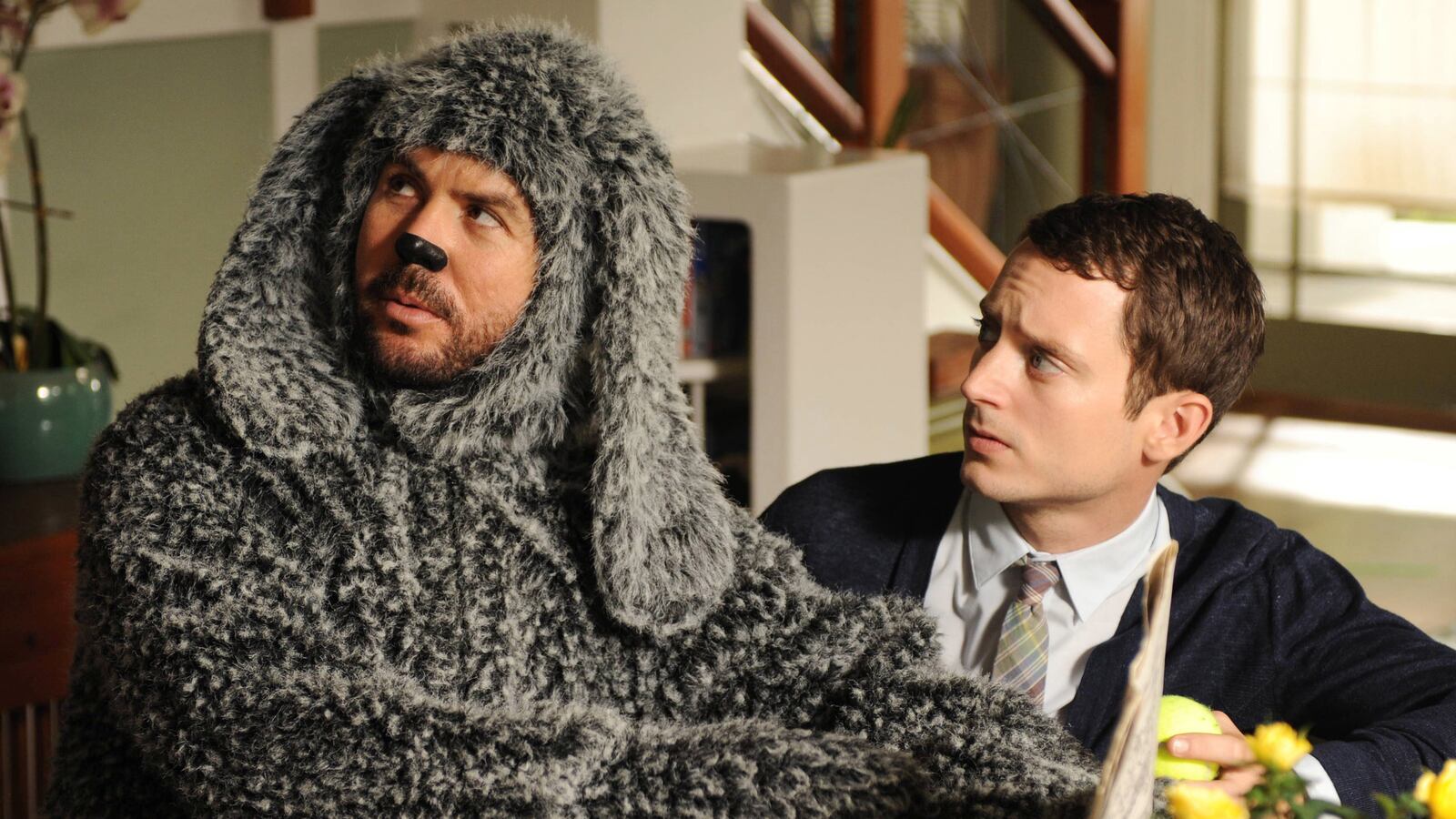I’d love to trade places With a dog for a day To know what he thinks And what he feels Does he think about life? Does he think about God? Or just about his next meal, like us? –Dan Bern, “Rolling Away”

What is the island? Who killed Rosie Larsen? Where in the world is Carmen San Diego? How’s Annie? Why is Number Six trapped in the village? Cliffhanger questions are carrots dangled in front of hungry episodic TV viewers, and yet, so few are ever satisfactorily answered.
And for good reason.
Wrapping up an enigma can be death for a show that keeps its audience’s attention by teasing possible answers to its narrative mysteries week after week. Once Laura Palmer’s killer was revealed, viewership for golden age icon Twin Peaks dropped faster than the water in the Snoqualmie Falls. Lost never settled any of its magical questions, instead opting for a storybook ending where everyone reunites with their loved ones in church before going off into the light together. (Although, to be fair to both shows, their expanded promotional materials answer many lingering questions; for more, see Twin Peaks’ The Secret Diary of Laura Palmer, and Lost’s “The New Man in Charge.”)
Enter FXX’s Wilfred, the American adaptation of the Australian series of the same name about a man named Ryan (played by Elijah Wood) and Wilfred, the talking dog that only Ryan can see and hear. Most episodes feature the ongoing adventures of Ryan and Wilfred as their oftentimes brash attitudes clash with the socially conservative world of suburban southern California, but every so often, some larger issue raises its head.
Like, “Why is Ryan the only one who can see and hear Wilfred?”
Perhaps the most brilliant aspect of the show is that longtime viewers who have watched, and rewatched, every episode and those who have never heard of the show can ask the same question: What is Wilfred?
On the one hand, Wilfred is a pot-smoking, hard-drinking, Matt Damon-loving, mongrel dog. Ill-mannered, irascible, and insane. On the other hand, he’s Ryan’s only friend and they spend what some might see as an unhealthy amount of time together, especially considering Wilfred isn’t even Ryan’s dog.
Wilfred belongs to Ryan’s next-door neighbor, former local news anchor and sometimes crush, Jenna Mueller (played by Fiona Gubelmann). In an interview with Troy Foreman of ThePopCulturePrinciple.com about the final season, Gubelmann said, “There is a tendency in writing for female characters to make them two-dimensional, especially the girl-next-door character. While Jenna definitely started out being very sweet and bubbly, over the years they have given her a lot of dark stuff.” Season 3 ended with Jenna confessing to Ryan that she was unhappy with her recent marriage (to recurring guest star and Sheboygan Ale salesman, Chris Klein) and then kissing her next-door neighbor and running away.
Series creator Jason Gann plays Wilfred in both the Australian original and the American remake. Created after Gann’s friend Adam Zwar related a story about going to a date’s house and imagining what her dog thought of him, the pair turned Wilfred into a short film exhibited at various film festivals, including Sundance. Where, in 2003, Gann met David Arquette, an early fan of the series. In a 2012 interview with the Salt Lake Tribune, Gann said, “He opened my eyes to the possibility of it being a show [in America].”
Before that could happen, Wilfred came to life on Australian TV screens with two series of eight episodes each on SBS TV. The tone of the original series is vastly different, with few points of commonality save for the talking dog. It ends with the Australian versions of the Ryan and Jenna characters getting married, shortly before Ryan (known as Adam) is hauled off to jail for a crime Wilfred convinced him to commit.
Many of the changes are due to the influence of longtime Family Guy and American Dad writer David Zuckerman, who co-created the American adaptation with Jason Gann. Zuckerman’s golden retriever served as his inspiration for dog behavior during production of the first season, but died prior to the broadcast. The beloved pet now appears on the end title card for each episode. It lent the American series a greater sense of poignancy. “The Australian version was much bleaker,” Zuckerman said in a 2011 interview with TVWeb.com.
Speaking about the differences between the series to Vulture.com’s Joel Keller, Gann said, “I didn’t know at the time that I wanted to make massive changes to the Wilfred character. It’s kinda like Wilfred is his bodyguard… That’s something Elijah brought out in me. Elijah’s a really likable guy. What Elijah brings to the character [of Ryan] really informs the relationship… And the idea of Wilfred being a protector and a guide as much as being a saboteur really fascinated me.”
Each episode of Wilfred begins with a quote, from which a single word is highlighted as the episode’s title and theme. The episodes all end with Ryan and Wilfred smoking a homemade bubbler and getting stoned in his basement. Prior to the start of the third season, Zuckerman told HappyCool.com, “We’re not a mass appeal show. We’re a weird, little, existential stoner comedy.”
The only other main cast member is Dorian Brown, who plays Ryan’s sister Kristen. Constantly at odds with her permanently stoned brother, Kristen is an unemployed obstetrician and single mother grounded to the point of severity. In an interview with AudioHollywood.net, Brown said, “She really pulls him in that direction he was trying to leave. I drag him back into that world that he was trying to run away from.” A sometimes welcome counterpoint to the insanity that accompanies a grown man and his possibly imaginary friend, Brown’s character is every bit as flawed a human as she often scolds her sibling for being. Still, when the married doctor who fathered her baby turns out to be a cad, Ryan helps care for the baby, Geoffrey (who can also talk to Wilfred).
The premise of the show is surreal enough, and most of the episodes feature little more than the two main characters bouncing off each other, but when they venture into the wider world, and interact with other people, the strange takes a turn toward the bizarre. In an interview with Esquire’s Andrew Steinbeiser before the premiere of Season 3, Gann said, “Whenever a new actor comes on board, they all try to avoid looking me in the eye. At first they’re like, ‘Oh my god, this is weird,’ because they have to act like I’m a dog, but then they have a human talking to them.” On at least one occasion, that included Ed Helms guest-starring as the owner of a dog kennel with a predilection for canine oral sex. Other guest stars on the series have included The Daily Show’s Kristen Schaal, Malcolm in the Middle’s Jane Kaczmarek, and Lost’s Nestor Carbonell as the father of Kristen’s baby.
Like other entries in the TV mystery genre, the show has promised answers, delivered red herrings, and somehow kept up the laughter in the face of grim situational comedy.
The first episode began with Elijah Wood’s Ryan attempting suicide. The Season 3 finale ended on a cliffhanger in which Ryan and Wilfred accidentally kill Ryan’s father and then discover a stone idol that resembles the talking dog. The twisted, implausible scenarios have prompted many fans to speculate that the entire show takes place in the character’s head à la “An Occurrence at Owl Creek Bridge.” But like all Wilfred’s questions, answers are seldom easy.
Independently of Ryan, Wilfred has a friend named Bruce (played by Dwight Yoakam) with whom the talking dog is involved in a long running game of devious one-upmanship. Ryan’s mother (played by screen legend Mary Steenburgen) is seen to have her own talking animal companion, a cat named Mittens (played by the equally legendary Rhea Perlman). Add to that, Ryan’s father (played by James Remar), ostensibly the show’s antagonist, was last seen playing an imaginary father on Showtime’s Dexter.
As the final season begins, Wilfred is poised to explore those questions more thoroughly, as Ryan and his semi-faithful companion explore the show’s deepening mythology. The official website teases a possible return of Ryan’s former fiancée, Amanda (played by Allison Mack). Also returning is original executive producer and showrunner David Zuckerman, along with Reed Agnew & Eli Jorné, who assumed the responsibilities for Season 3.
One thing on which everyone involved with the show agrees is that it won’t all be a dream and Wilfred won’t turn out to be a magic creature. No matter what answers come, if any, in the end it’s a show about a man and his dog, a relationship almost guaranteed to end in death. As George Carlin used to say, “It’s part of the deal. It’s what happens when you have a pet. You have them for a little while and then they ‘go away.’ You’re purchasing a small tragedy.”






